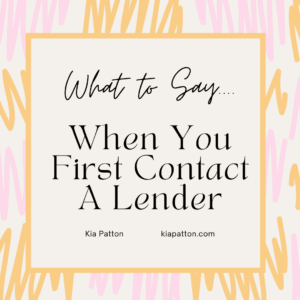How to Get the Best Mortgage Series – Week 1

Follow this series to learn how to get the best mortgage for your specific financial situation and goals. You’ll see what steps you need to take throughout this process to make it productive and successful!
This week’s article is all about what to say when you first contact a lender. And, guess what?! It’s not “How much can I be approved for?” No, no!
Most people can be approved for much more than they want to spend. I’ll teach you exactly what to say and how to say it to make sure you’re getting what you need before you start your house hunt.
Contact More Than One Lender
It’s always good to shop around for a lender to see what mortgage opportunities are available right now. Different lenders can offer different programs. This doesn’t mean just researching on the internet (that’s okay to get a general idea!), but rather making appointments to talk to two to three lenders on the phone or in person.
Based on your particular situation, I can give you a few different options that I think would be the best to start with, so definitely be in touch with me before you start trying to find someone on your own.
With all the mortgage options out there, lenders really need to ask you specific questions to learn more about your goals to make sure you have the correct mortgage. It’s not a one-size-fits-all kind of mortgage anymore!
Be Prepared
You may already know that you will need to gather financial information for your lender to review — pay stubs, bank account statements, W-2s, tax returns, information on current loans and credit lines.
But, do you know what you need to say to your lender? Your initial discussion with your lender can alter the pre-approval amount that they give you. You want something that truly matches your budget and not the highest amount you can be approved for (steering you toward out-of-budget homes!).
Focus on Monthly Payments Not Price
Lenders will look at how much you can afford when they review your financial information to give you a pre-approval amount. However, how much you can afford isn’t the same as how much you want to pay per month.
Many buyers will make a blanket statement — “I want to spend $400,000” — since their lender pre-approved them for that amount. However, when asked how much they want to spend per month, it’s often much lower than the price range they were approved for!
Since many buyers can be approved for much more than they want to spend every month, you need to avoid this from happening to you. You want the lender to go the other way – focus on your monthly payments first then figure out the price. Keep reading to see why this system is better!
Backward Is Best
First, tell your lender what monthly payments you are comfortable with and ask them to go “backward” to determine the corresponding price range. By working this way, you’ll be approved for an amount that is equivalent to the monthly payments that work with your budget.
By breaking it down to the monthly level, you’ll have a better understanding of how much you can afford and also be able to take into account the other regular costs when owning a home – property taxes, insurance, maintenance, utilities, condo fees. (Remember to factor in your down payment and any homebuyer assistance programs when determining your budget.)
Going backward is the one and only way to make sure you get the house you want for the price you want.
Mortgage Rule of Thumb
When calculating your monthly budget, there’s a rule of thumb you should keep in mind: Every $10,000 in purchase price only adds an additional $85 (ish). This makes it easier to find that perfect balance between the funds required for purchasing a home and your monthly mortgage payment.
Same Purchase Price – Different Monthly Payment
Here’s another reason you never want to begin with a blanket price. Even if the purchase price is exactly the same, your monthly payment could be very different between two properties.
For example, the monthly payments for a $500,000 condo will be completely different than for a $500,000 single-family home. There are different costs you’d need to consider for each option, such as condo fees. Monthly payments can vary depending on where and what you buy. By focusing on that, you’ll know if you can really afford a home or not.
The goal of this series is to help you see that there are a lot of options out there, that it’s not a one-size-fits-all “thing” to get a mortgage and there is a lot to know. Plus, I don’t want you to feel like you have to figure all this out on your own. I’m here to help you navigate the options and point you in the right direction based on YOUR current financial situation and goals. The advice I give one client might be different than the advice I give another client because their situations may be completely different. That’s how you should approach getting a mortgage too—look at YOUR specific situation, not what anyone else is doing and make the best choices for YOU.
Let me know if you have any questions. Look out for next week’s topic: “How Much Do I Need for a Downpayment.” So stay tuned!